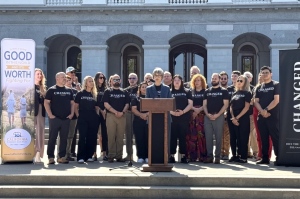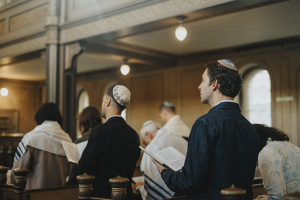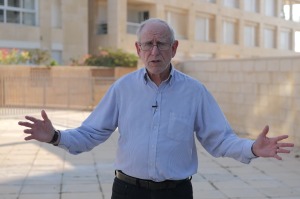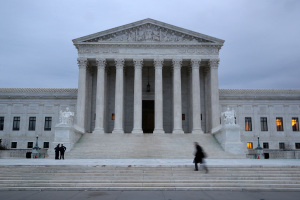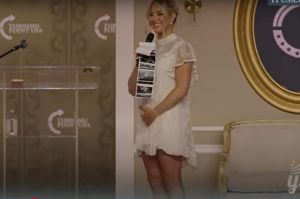Many Catholics Led by Conscience, Not the Pope, on Issues of Abortion
Can a Pro-Choice Philosophy Be in 'Agreement' With Christianity?
In 2010, a nun serving as the administrator and member of the ethics committee at St. Joseph's Hospital approved a 27-year-old mother's abortion, and the procedure reportedly saved her life. The nun, considered a saint by some, was soon excommunicated by the Vatican for her involvement – a move that some found disagreeable.
"In this tragic case, the treatment necessary to save the mother's life required the termination of an 11-week pregnancy," the hospital said in a statement. "This decision was made after consultation with the patient, her family, her physicians, and in consultation with the Ethics Committee."
The Holy See's decision sparked a storm of outrage among the hospital staff of the Catholic facility, and heated debates among the public.
In the 1974 Declaration on Procured Abortion, the Vatican's latest statement on abortion, it is determined that life begins at conception.
"In reality, respect for human life is called for from the time that the process of generation begins. From the time that the ovum is fertilized, a life is begun which is neither that of the father nor of the mother, it is rather the life of a new human being with his own growth. It would never be made human if it were not human already," the declaration reads.
The Vatican has also determined that nothing justifies abortion, not even a threat to the mother's life or the child's likely deformity.
The Holy See's blanket ban abortion is a difficult question for some Roman Catholics, especially in cases in which a mother's life is at risk.
According to Daniel C. Maguire, professor of Theology at Marquette University, there have been two traditions regarding abortion in Catholic history. The first tradition does not allow for abortion, even in a case when the mother's life is at stake, he told The Christian Post. However, there has also been a "strong" pro-choice tradition in Catholicism, Maguire said, which has been allowing abortions for "serious" reasons as early as in the 16th century.
These two traditions were coexisting for a long time, Maguire said. As an example he gave the story of an archbishop of Florence who was canonized as St. Antoninus in 1523. This archbishop is also known for being the first saint to openly discuss sexual issues and allow abortions under specific circumstances, Maguire claims.
That pro-choice tradition has been "suppressed" from public view, the theology professor told CP.
But does going against Vatican teachings prevent one from calling himself a Catholic? Absolutely not, insists Maguire. The church is not a corporation, he explained. In a corporation, if the board of directors has a certain policy, everybody in the company has to follow it. But in Catholicism there are three sources of truth, the church hierarchy being only one of them. The other two – the Magisterium and Sensus Fidelium, the "sense of the faithful," which refers to doctrinal truth recognized by the whole body of the faithful.
"In a church where truth can come from any of those three sources, your conscience should be informed about all three," Maguire said. Therefore one should know what the bishop's position is, what the theologians are saying and what the people think about it.
The latter might be just about the hardest thing to determine. However, if judged by multiple sets of statistics accumulated by Catholics for Choice (CFC), a Catholic advocacy group, the majority of U.S. Catholics actually do not follow the Vatican's absolute ban on abortion.
According to data collected by CFC, 86 percent of Catholics approve of abortion when a woman's health is seriously endangered, and 78 percent think it should be possible for a woman to obtain an abortion when a pregnancy is the result of rape, according to a 2008 General Social Survey (GSS). Quoting other data from research groups, only 14 percent of Catholics in the U.S. agree with the Vatican's position that abortion should be illegal. Catholic women have abortions at the same rate as other women – 28 percent of women surveyed who had an abortion self-identified as Catholic, according to one study. In addition, a poll of almost 3,000 adults found that the views of Catholics on abortion are consistent with those of the rest of the population.
"We try to be an expression of Catholicism as it's lived by ordinary people," Jon O'Brien, Catholics for Choice's president, told CP. "The great majority of people in the Catholic church actually disagree with the dictates of the Vatican. Matters related to sex, marriage, family and motherhood. So we're part of a great majority who believe that Catholic teaching and conscience means that every individual must follow his or her conscience and respect the right of others to do the same."
O'Brien, an Irishman born and raised in the Catholic faith, saw the position of Catholic women as underprivileged and harmed by the laws of the Catholic church. Before coming to CFC, he worked as program manager at the International Planned Parenthood Federation's European Bureau in London, overseeing the establishment of family planning clinics in Eastern Europe during a time of immense political and social turmoil.
The organization – which also advocates for the church to allow the usage of contraception – has a goal of "creating a world where all women and men are trusted to make responsible decisions about their lives," according to its website.
Catholics can make decisions concerning their families based on their consciences, O'Brien told CP.
"The Church takes the idea of conscience very seriously," he said. "The Catechism tells us that a human being must always obey the certain judgment of its conscience. The Church takes conscience so seriously that Richard McBrien, in a study on Catholicism, explains that even in cases of a conflict with the moral teachings of the Church, Catholics not only may, but actually must follow the dictates of their conscience rather than the teachings of the church. "
Now, it is not the same as casual disagreement, O'Brien explained. That would not be enough to ignore moral teachings of the Catholic Church. That is why the organization sacrificed years to surveying public opinion among American Catholics and studying specific cases closely.
"Catholics are obliged to know and consider thoughtfully the Catholic teachings," O'Brien said. "Catholics believe that the Church is a major resource of moral direction and leadership; it's the product of centuries of experience and thinking. But in the end, well-formed conscience reins."
Jeff Field, spokesperson for the U.S. Catholic League, told CP that O'Brien's group has been condemned by Catholic bishops, insisting that Catholics for Choice is not officially recognized as "Catholic" – as the organization clearly contradicts one of the main teachings of the Vatican. Such organizations are "false" as far as the church is concerned, Field said, emphasizing that there is no way around the absolute ban on abortion.
"There are certain cases that may be harmful for the mother," Field said, but the Roman Catholic Church views abortion as an "intrinsic evil." The act cannot be justified just as other acts which the church sees as evil – like genocide or racism – cannot be justified either, he said.
















